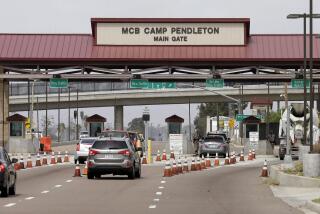Military Shows Sensitivity to Reservist : Call-up: Family will be reunited. Woman is granted reassignment to Washington, where her Navy husband was recently transferred.
- Share via
CAMP PENDLETON — Petty Officer 3rd Class Pamela Slayton is on her way, with her children, to the naval base at Bremerton, Wash., reassigned just 72 hours after reporting with her reserve unit to the Naval Hospital here.
It shows that the military can respond sensitively--and quickly--to the domestic problems of reservists called to active duty, said Navy and Marine officers familiar with her case. Slayton’s fate came up during an interview session with reservists at the base Wednesday.
Slayton, in civilian life a 31-year-old computer technician for the Southern California Gas Co., was startled two weeks ago when her Los Angeles-area hospital unit was called up, just five days after her Navy husband had been transferred from Long Beach to Bremerton, leaving her alone to care for their two sons, Jeffrey, 9, and Gregg, 7.
At first, she was uncertain who would care for the boys. Commuting from her home in West Covina to Camp Pendleton every day seemed out of the question.
After enlisting her mother’s help temporarily, Slayton asked a special board of reserve officers, assigned by the Los Angeles Naval Reserve to handle such emergencies, to intercede in her behalf. She was ready to go to active duty, she told the board, but she wanted to perform it in Bremerton.
Board members said they would refer the matter to the naval reserve commander in New Orleans. And while she waited to hear what would happen, she reported for duty at Pendleton.
On the day before she left, she remarked in an interview, “There’s a few gung-ho people in our unit who are saying ‘hurrah’ (about being called up). As for me, I’m a little calmer today than I was when I first got my orders.”
On Wednesday, Marine and Navy press officers at Camp Pendleton made five of the 60 reservists called to duty at the Naval Hospital available for interviews about how they were melding into military life.
A short distance away, hundreds of troops--all wearing gas masks--could be seen walking several abreast at a fast pace. “A conditioning exercise,” explained a Marine press assistant. “A 10-mile hike. . . . We did these long before Saudi Arabia.”
One by one the reservists told, mainly with good cheer, about the financial, living and other adjustments they were making. It was only the highest ranking of the five, Navy Capt. Brendon Hirschberg, a general surgeon from Flagstaff, Ariz., who expressed displeasure.
Hirschberg said there was “some confusion of assignments” at the hospital because the resident doctors had not yet left for Saudi Arabia and the newcomers found the duty assignments “overfilled.”
“They’re waiting to see what happens in Saudi Arabia before they send the doctors,” he said. In the meantime, he hoped to return to Flagstaff for one long weekend a month to perform his share of his partnership’s surgery and see his family.
The others, all from Slayton’s unit, said they were coping, even though one was commuting 50 miles every day from Cypress, and one missed the husband she had married only last March.
What about Slayton, they were asked at the end of the interview session. “Oh, she was taken care of,” said Petty Officer 1st Class Nancy Stipe. “She was reassigned in 72 hours.”
“There have been one or two other such cases,” said Navy Cmdr. Jay Pettit later Wednesday at the Los Angeles Naval Reserve Center in Elysian Park. “We try to be understanding of special circumstances.”
More to Read
Sign up for Essential California
The most important California stories and recommendations in your inbox every morning.
You may occasionally receive promotional content from the Los Angeles Times.













